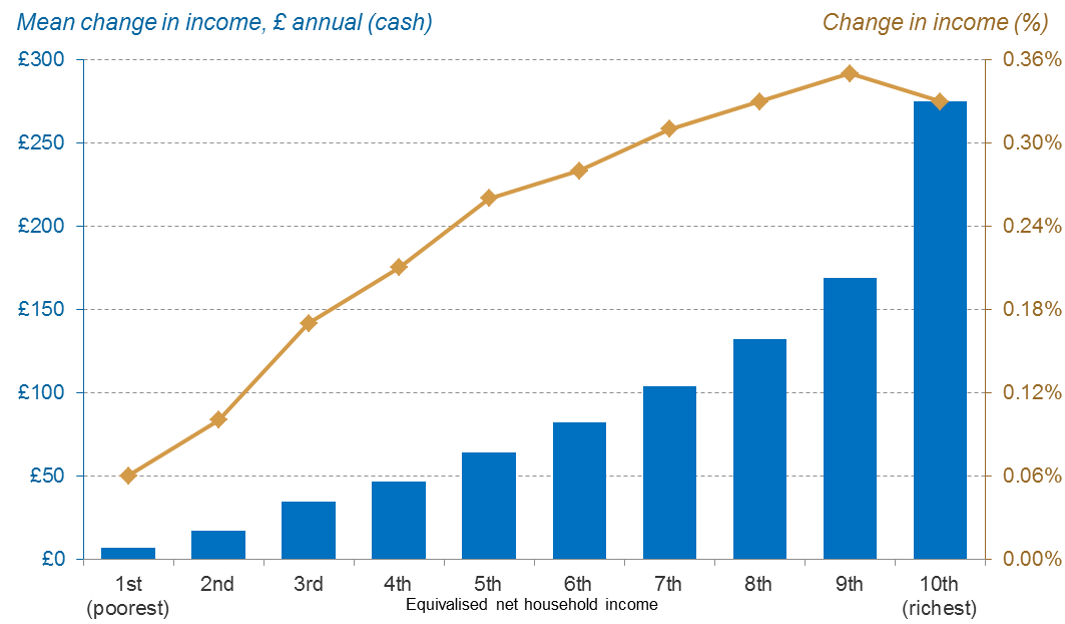George Osborne was described on Wednesday as the man who wants to have it all. He’s a man for all seasons, someone who on the one hand can introduce policies with widescale appeal, yet on the other be on the side of big business.
I believe however that this week’s budget represented something of a departure from this bent. That is, many of the Chancellor’s fiscal measures can be interpreted as a helping hand to the richest in UK society, to the detriment of the poorest.
Here are my four takeaways
- As hinted at above, Osbo’s measures, particularly around personal income tax will actually benefit the richer much more than the poorer. Two such policies that will ensure this will are a.) the increase in the personal income tax threshold to £11,500 and b.) the increase in the point at which the 40 per cent threshold will kick in. Provided your eyes haven’t glazed over at this point, I’d urge you to take a look at the nifty graph below from the respected Resolution Foundation. It shows that the greatest benefit of the aforementioned income tax cuts will go to the richest 10% of the population.
 ‘How can this be?’ I hear you ask. Well, in regard to increasing the personal income tax threshold to £11,500, whilst its true that you can now earn this sum without paying any income tax whatsoever, the poorest probably aren’t paying any already, so any further increase in the threshold won’t help them, at all. Sorry about that. Secondly, our tax system is based on what you earn as an individual, taking no account of those in your family who might not earn anything. Indeed, measures like this will give more benefit to households where both members of a couple are earning over the threshold than only one. And unsurprisingly, poverty tends to be more likely in single earner households. Despite the facts, policies like this are popular with the electorate, hence why Gideon, ever the politically astute cat, persists with such ruses.
‘How can this be?’ I hear you ask. Well, in regard to increasing the personal income tax threshold to £11,500, whilst its true that you can now earn this sum without paying any income tax whatsoever, the poorest probably aren’t paying any already, so any further increase in the threshold won’t help them, at all. Sorry about that. Secondly, our tax system is based on what you earn as an individual, taking no account of those in your family who might not earn anything. Indeed, measures like this will give more benefit to households where both members of a couple are earning over the threshold than only one. And unsurprisingly, poverty tends to be more likely in single earner households. Despite the facts, policies like this are popular with the electorate, hence why Gideon, ever the politically astute cat, persists with such ruses. - The Chancellor also announced measures to introduce something called a ‘lifetime ISA’ If you’re under 40, you’ll be able to save up to £4,000 per year, and if you do, the Government will very kindly top that up by 25%, thus boosting your nice little nest egg by £1,000 per annum. Savings are good, if you can earn enough to save. The problem is, many can’t. And don’t think this only applies to unemployed layabouts. Many who are in paid employment cannot save anything either. Bad news if you want a pension, or a property deposit, or a rainy fay fund should things get rainy, or a packet of crisps. Its also worth mentioning that this won’t even begin to deal with the biggest problem facing the housing market, supply. If this sticky wicket was remedied, perhaps mega ISAs like this wouldn’t be needed in the first place. Ha, that’s funny.
- George Osborne bravely (like King Arthur) has promised a surplus of £10 billion by 2019-20. This Excalibur like pledge coming despite Government numbers predicting a deficit of £21.4 billion just the year before. Such a promise seems implausible at best. This serves as a timely reminder then that economic forecasts can and often do change from one budget to the next, thus, we shouldn’t pay too much attention to them. Lest we forget the promise by Ossie G that the dastardly deficit would be eliminated by 2015. Sadly, even if Osborne does break his fiscal rules, its unlikely the public on the whole will mind too much. Make of that what you will.
- George ‘four seasons’ Osborne has carved his reputation on the notion that those with the broadest shoulders (or some other like-minded metaphor) should bear the biggest burden in terms of getting our blasted deficit down. Which makes one his measures announced on Wednesday rather curious – cutting £4.4 billion of disability benefit – directly affecting a group which many will surely agree are a pretty vulnerable segment of our population. To put it another way, 200,000 people with access to the PIP (Personal Independent Payment) will lose almost £3,000 per year. Not one of George’s more politically cat like moves, a view shared by many of his own MP’s. This one hasn’t finished yet though I fancy. On Thursday’s edition of Question Time, Education Secretary Nicky Morgan said ‘discussions were still ongoing on the issue’ or something.
*UPDATE 18/03/2016 – As I said, this one hasn’t finished yet. DWP Secretary of State Iain Duncan Smith has tonight resigned, seemingly over the disability cuts announced by the Chancellor. You can read his resignation letter here: